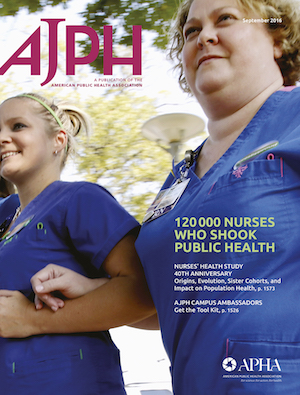 Forty years, multiple cohorts, and 275 thousand participants and counting. The September issue of the American Journal of Public Health celebrates the substantial knowledge on nutrition and other aspects of chronic disease prevention generated by the historic Nurses’ Health Studies.
Forty years, multiple cohorts, and 275 thousand participants and counting. The September issue of the American Journal of Public Health celebrates the substantial knowledge on nutrition and other aspects of chronic disease prevention generated by the historic Nurses’ Health Studies.
The Nurses’ Health Study (NHS) was launched in 1976 with over 121,700 nurse participants to examine the risk factors for major chronic diseases in women. In the 40 years since, the original cohort has grown to include multiple offshoots, including the NHS II, and the most recent NHS 3. An additional cohort called the Growing Up Today Study (GUTS) began in 1996 that includes the children of those enrolled in the NHS II.
Altogether, these prospective cohort studies have followed more than 275 thousand participants and supported many hundreds of publications, providing insight into women’s reproductive health, contraception, and breast cancer, as well as illuminating the role of diet, lifestyle, and genetics in chronic disease prevention. The NHS has retained an estimated 94 percent of the original study population, thanks to the unwavering support and commitment of its participants.
“In so many aspects of life, the Nurses’ Health Studies have provided evidence that allows individuals, health care providers, and policy makers to reach informed decisions,” said Walter Willett, MD, DrPH, who has helped lead this work since 1977. “This would have all been impossible without the amazing commitment of the participants, who have shared their personal information over the last four decades”
In celebration of its 40-year anniversary, much of the September 2016 issue of the American Journal of Public Health delves into the history of the NHS, and its significant contributions to public health. Explore the full issue or the open-access individual articles, highlighted below:
Overview Articles
- “120 000 Nurses Who Shook Public Health”
- An editorial by AJPH Editor-in-Chief Dr. Alfredo Morabia, discussing the creation of the NHS, and the “historically outstanding response” from the study’s participating nurses.
- “Origin, Methods, and Evolution of the Three Nurses’ Health Studies”
- A summary of the evolution of the NHS by researchers, including its origins, data collection methods, influence on public health recommendations, and a discussion on future directions for collaboration and innovation.
- “The Impact of the Nurses’ Health Study on Population Health: Prevention, Translation, and Control”
- The NHS findings have influenced public health policy and practice both locally and globally to improve women’s health. A summary of the overall impact of the study on the health of populations through its contributions on prevention, translation, and control.
- “How the Nurses’ Health Study Helped Americans Take the Trans Fat Out”
- The NHS provided groundbreaking evidence that foods containing trans fat are particularly harmful, informing the policy change for the removal of GRAS status for partially hydrogenated oils.
- “Diet Assessment Methods in the Nurses’ Health Studies and Contribution to Evidence-Based Nutritional Policies and Guidelines”
- The long-term, periodically collected dietary data in the NHS have contributed extensively to understanding of the dietary determinants of various diseases, informing dietary guidelines, and shaping nutritional policy. A review of the contributions.
- “Evaluating Public Health Interventions: 4. The Nurses’ Health Study and Methods for Eliminating Bias Attributable to Measurement Error and Misclassification”
- A commentary on the NHS’ methods for eliminating bias with use of food frequency questionnaire to assess dietary intake over time, and to relate diet to health.
- “Voices From the Nurses’ Health Study”
- Insights and testimonies from selected participants involved in various cohorts of the NHS.
Topic-Specific Articles
Chronic diseases:
- “Diet, Lifestyle, Biomarkers, Genetic Factors, and Risk of Cardiovascular Disease in the Nurses’ Health Studies”
- Contribution of the Nurses’ Health Studies to Uncovering Risk Factors for Type 2 Diabetes: Diet, Lifestyle, Biomarkers, and Genetics”
- “Key Findings on Alcohol Consumption and a Variety of Health Outcomes From the Nurses’ Health Study”
- “Determinants and Consequences of Obesity”
Cancer-specific:
- “Breast Cancer Research in the Nurses’ Health Studies: Exposures Across the Life Course”
- “Colorectal Cancer Epidemiology in the Nurses’ Health Study”
- “Nurses’ Health Study Contributions on the Epidemiology of Less Common Cancers: Endometrial, Ovarian, Pancreatic, and Hematologic”
Other diseases and insights:
- “Exogenous Hormone Use: Oral Contraceptives, Postmenopausal Hormone Therapy, and Health Outcomes in the Nurses’ Health Study”
- “Insights Into Nephrolithiasis From the Nurses’ Health Studies”
- “Psychiatric, Psychological, and Social Determinants of Health in the Nurses’ Health Study Cohorts”
- “Epidemiology of Major Neurodegenerative Diseases in Women: Contribution of the Nurses’ Health Study”
- “Genomics, Telomere Length, Epigenetics, and Metabolomics in the Nurses’ Health Studies”
- “Contributions of the Nurses’ Health Studies to Reproductive Health Research”
- “Epidemiological Assessments of Skin Outcomes in the Nurses’ Health Studies”
- “Contribution of the Nurses’ Health Study to the Epidemiology of Cataract, Age-Related Macular Degeneration, and Glaucoma”
Other longitudinal studies inspired and informed by NHS:

